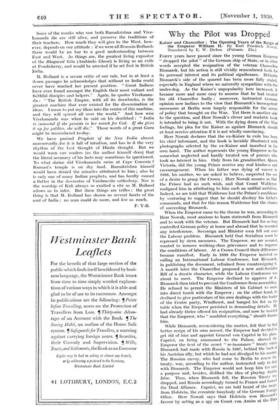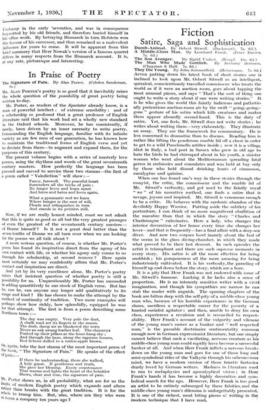Why the Pilot was Dropped
Kaiser and Chancellor : The Opening Years of the Reign of Foam' years have passed since the young German Emperor " dropped the pilot " of the German ship of State, or in other
words accepted the resignation of the veteran Chancellor Bismarck, but his action is still vividly remembered both for its personal interest and its political significance. Hitherto Bismarck's side of the quarrel has been more fully stated, especially in England where we naturally sympathize with the under-dog. As the Kaiser's unpopularity here increased, it became more and more easy to assume that he had treated his old Chancellor badly ; moreover, instructed German opinion now inclines to the view that Bismarck's incompetent successors at Berlin were largely responsible for the errors of policy that brought on the War. Yet there is another side to the question, and Herr Nowak's clever and readable book is intended to bring it out. With the dying down of the War feelings, his plea for the Kaiser as against Bismarck should at least receive attention if it is not wholly convincing.
Herr Nowak declares that the ex-Kaiser in exile has been his chief informant, and the book is lavishly illustrated with photographs selected by the ex-Kaiser and inscribed in his own hand. The author represents the young Emperor as the somewhat neglected and hardly treated son of parents who took no interest in him. Only from his grandmother, Queen Victoria, did the young Prince receive any real kindness and encouragement. When his father was dying of cancer in 1888, his mother, we are asked to believe, suspected the son of a desire to grasp the Crown ; Herr Nowak assures us that the Prince had no such wish, and that Count Waldersee maligned him in attributing to him such an unfilial ambition. Indeed, we are told that Waldersee lost the Prince's confidence by venturing to suggest that he should disobey his father's commands, and that for this reason Waldersee lost the chance of succeeding Bismarck.
When the Emperor came to the throne he was, according to Herr Nowak, most anxious to learn statecraft from Bismarck and to work with the veteran. But Bismarck had for so long controlled German policy at home and abroad that he resented any interference. Sovereign and Minister soon fell out over the Labour problem. Bismarck held that Socialism insist be repressed by stem measures. The Emperor, we are assured, wanted to remove working-class grievances and to improve the conditions of labour. At a Crown Council their differences became manifest. Early in 1890 the Emperor insisted on calling an International Labour Conference, but Bismarck, in publishing the document, refrained from emmtersig,ning it. A month later the Chancellor proposed a new anti-Socialist Bill of a drastic character, while the Labour Conference was about to meet. The Emperor declined to approve of it. Bismarck then tried to prevent the Conference from assembling. He refused to permit the Ministers of his Cabinet to come into direct touch with the Emperor ; on the other hand, he declined to give particulars of his own dealings with the leader of the Centre party, Windhorst, and banged his fist on the table when the Emperor persisted in demanding details. lie laid already thrice offered his resignation, and now he insisted that the Emperor, who " muddled everything," should dismiss him.
While Bismarck, reconsidering the matter, felt that he lad better resign of his own accord, the Emperor had decided to get rid of him and appoint General von Caprivi in his place. Caprivi, on being summoned to the Palace, showed the Emperor the text of the secret " re-insurance " treaty saki' Bismarck had made with Russia in 1887, behind the back of his Austrian ally, but which he had not divulged to his master. The Russian envoy, who had come to Berlin to renew the treaty, was, according to the author, instructed only to deal with Bismarck. The Emperor would not keep him for such a purpose and, besides, disliked the idea of playing Austri' false. Thus, when Bismarck fell, the Russian Treaty tsar dropped, and Russia accordingly turned to France and formed the Dual Alliance. Caprivi, we are told heard of the treaty' from Holstein, the eccentric busybody of the German Fore0 Office. Herr Nowak says that Holstein won Bismarck., favour by acting as a spy on Count .von Arnim at the Paris
Embassy in the early 'seventies, and was in consequence boycotted by his old friends, and therefore buried himself in his office work. By betraying Bismarck in turn Holstein won the favour of his successor, and thus remained as a malevolent influence for years to come. It will be apparent from this brief summary that Herr Nowak's version of a famous quarrel differs in many respects from the Bismarck account. It is, at any rate, picturesque and interesting.











































 Previous page
Previous page